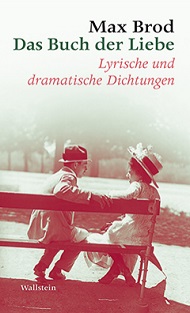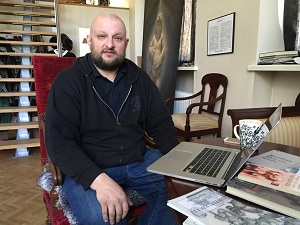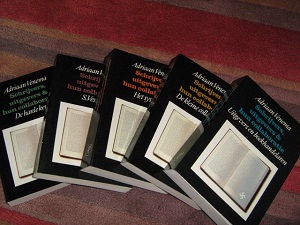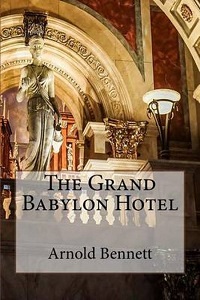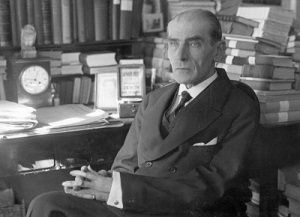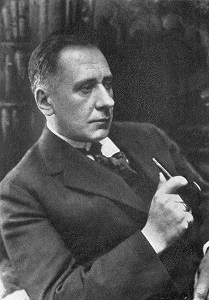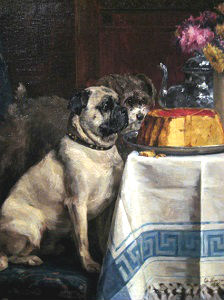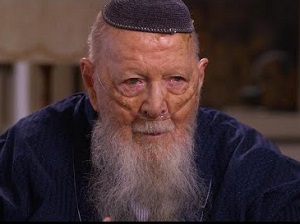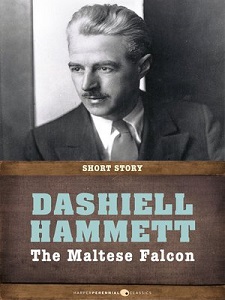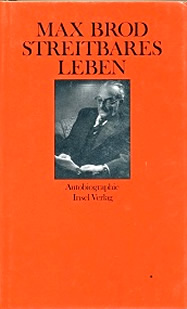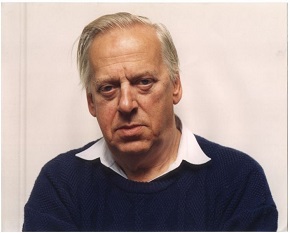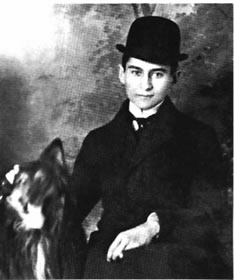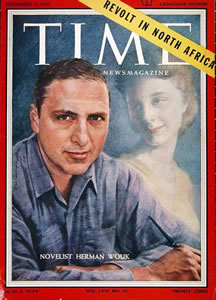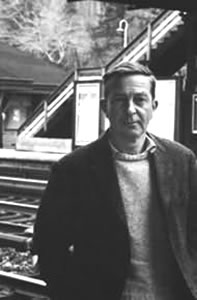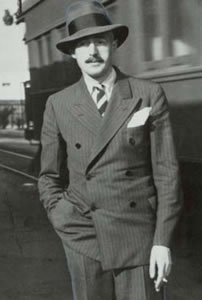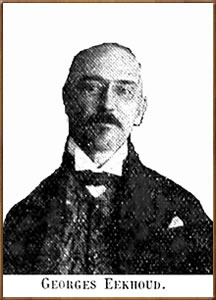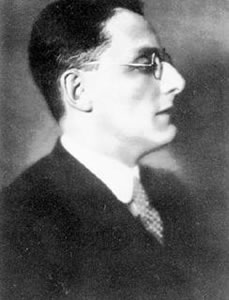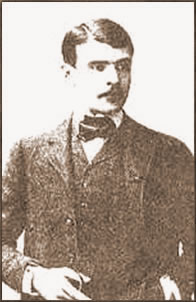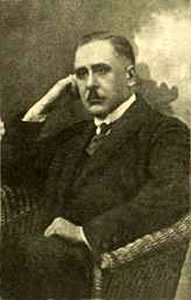De Amerikaanse dichteres Linda Pastan werd geboren op 27 mei 1932 in New York. Zie ook alle tags voor Linda Pastan op dit blog.
Something About The Trees
I remember what my father told me:
There is an age when you are most yourself.
He was just past fifty then,
Was it something about the trees that make him speak?
There is an age when you are most yourself.
I know more than I did once.
Was it something about the trees that make him speak?
Only a single leaf had turned so far.
I know more than I did once.
I used to think he’d always be the surgeon.
Only a single leaf had turned so far,
Even his body kept its secrets.
I used to think he’d always be the surgeon,
My mother was the perfect surgeon’s wife.
Even his body kept its secrets.
I thought they both would live forever.
My mother was the perfect surgeon’s wife,
I can still see her face at thirty.
I thought they both would live forever.
I thought I’d always be their child.
I can still see her face at thirty.
When will I be most myself?
I thought I’d always be their child.
In my sleep it’s never winter.
When will I be most myself?
I remember what my father told me.
In my sleep it’s never winter.
He was just past fifty then.
What We Want
What we want
is never simple.
We move among the things
we thought we wanted:
a face, a room, an open book
and these things bear our names–
now they want us.
But what we want appears
in dreams, wearing disguises.
We fall past,
holding out our arms
and in the morning
our arms ache.
We don’t remember the dream,
but the dream remembers us.
It is there all day
as an animal is there
under the table,
as the stars are there
even in full sun.
Vermilion
Pierre Bonnard would enter
the museum with a tube of paint
in his pocket and a sable brush.
Then violating the sanctity
of one of his own frames
he’d add a stroke of vermilion
to the skin of a flower.
Just so I stopped you
at the door this morning
and licking my index finger, removed
an invisible crumb
from your vermilion mouth. As if
at the ritual moment of departure
I had to show you still belonged to me.
As if revision were
the purest form of love.

De Nederlandse schrijver, journalist, blogger en gamedeskundige Niels ’t Hooft werd geboren in Leiderdorp op 27 mei 1980. Zie ook alle tags voor Niels ‘t Hooft op dit blog.
Uit: De verdwijners
“De vorige keer dat ze haar ouders om hulp had gevraagd, was dat uitgelopen op een drama. Inmiddels wilde ze niet alleen Isobel opsporen, maar waren er nieuwe problemen ontstaan door de afwezigheid van haar zusje: Marthes psychologiestudie was uitgelopen, en haar spaargeld was opgegaan aan de huur van het gezamenlijke zolderappartement, dat ze nu in haar eentje bewoonde. ‘We hebben jou en Isobel tot jullie achttiende gespekt,’ hadden ze gezegd. `We hebben een fortuin in jullie opleidingen gestoken. Wat verwacht je in vredesnaam nog meer van ons? We hebben Isobel steeds onderdak geboden na haar zelfmoordpogingen en haar psycholoog betaald. Wij vinden het een opluchting dat ze rust heeft gevonden in Amerika. Ben jij daar dan niet blij mee?’ Er was iets losgeschoten in Marthes hoofd. Ze was zeldzaam kwaad geworden en gaan schreeuwen. Haar ouders hadden haar hoofdschuddend het huis uit gezet.
Dit waren mensen die hun hond beter begrepen dan hun bloedeigen dochter. Het stinkbeest. Ook nu gebeurde aanvankelijk waarvoor ze had gevreesd.
Het gesprek ging er in eerste instantie over hoe zwaar zij het hadden, twee ploeterende Hollanders die de last van de wereld op hun schouders droegen. Over hun moeizame relatie en de bijbehorende therapie. Over de perikelen in het ziekenhuis, haar moeder was arts, en over de krimp in de 1T -sector, haar vader was reorganisatiemanager. Maar gaandeweg was de toon veranderd, of misschien had Marthe met een ander oor geluisterd.
`Laat me even uitpraten,’ had haar moeder gezegd. ‘Hoe het filmpje ook is gemaakt, waar in de wereld ze zich ook bevindt, Isobel wil ons vertellen dat we ons geen zorgen moeten maken. Je vader en ik hebben ons
bij die boodschap neergelegd, en misschien moet jij dat ook doen. Isobel zal altijd onze dochter zijn, tot het bittere eind heeft zij een plekje in ons hart. Daar verandert dit niets aan. Ze zal ook altijd jouw zusje zijn. Juist daarom zou je verder moeten gaan met je eigen leven.’
Haar vader was naar de kast in de voorkamer gelopen. ‘Kijk eens,’ zei hij. Hij pakte een Google-bril uit zijn postvakje. Marthe zag dat het een nieuw model was, met een buffelhoornen montuur waarin de techniek nu
onzichtbaar was verwerkt. ‘De bril legt beelden op de wereld om me heen. Extra informatie, ontzettend handig. Hij laat me bijvoorbeeld zien wat de route naar de supermarkt is, en wat jouw hobby’s zijn.’ `Dat
weet ik toch allang,’ had Marthe gezegd. Haar vader zette de bril op en tikte met zijn wijsvinger tegen de zijkant. ‘Je moeder en ik hebben oude beelden van Isobel laten bewerken. Homevideo’s, dat soort dingen. Haar beeltenis is vrijstaand gemaakt en reageert realistisch op de omgeving.’
Er verscheen een glimlach op zijn gezicht. Marthe beet op haar onderlip. ‘Nu is ze altijd bij ons, als we dat willen.’ Marthe zag haar vaders ogen vochtig worden. ‘Wil je ook?’ zei hij. ‘Ze heeft nu het spijkerjasje aan dat ze kreeg op haar vijftiende verjaardag.’
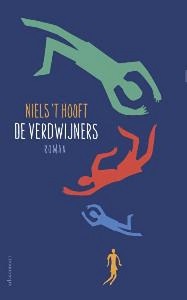
Niels ’t Hooft (Leiderdorp, 27 mei 1980)
De Nederlandse schrijver, journalist en columnist Jan Blokker werd geboren in Amsterdam op 27 mei 1927. Zie ook alle tags voor Jan Blokker op dit blog.
Uit: Séjour
“De vrouw zette haastig de boodschappentas naast zich neer en knielde. Tien roodgelakte nagels rustten op de smalle handruggen. Ze schraapte haar keel, keek vluchtig naar de priester en viel in: … que vous nous voyez, que vous nous entendez, que vous connaissez toutes nos pensées, tous nos désirs, les mouvements les plus secrets de nos coeurs… Ze merkte niet, dat haar tas omviel; ze zou evenmin gemerkt hebben, dat ik naast haar schoof. Maar ik schoof niet naast haar. Ik zat in de nachttrein uit Parijs, die net Aurillac had gepasseerd, waar het daagde. We stegen, het bergland van Cantal in. Ik vertelde het meisje tegenover me, dat in Brives was ingestapt, van de mensen die ik in onze coupé had ontmoet sinds ik Parijs verliet, de vorige avond. Een reis als een destillatie, een gefractionneerde. Ze scheen vaag te begrijpen hoe complimenteus mijn relaas voor haar was. Ik noemde de naam Chateauroux, die ze kende. In het holst van de nacht was de trein er binnengelopen. Er waren uit mijn coupé drie mensen gestapt, ik bleef alleen over. Ik had het gevoel dat daarna de trein voor mij alleen reed, maar er moeten nog andere mensen in gezeten hebben. Toch was de destillatie niet voltooid: uit de laatste fractie was damp, gezuiverde damp overgebleven, die condenseerde in Brives van waar het meisje naar Murat reisde, waar de vrouw haar morgengebed zei.
We passeerden een dorp: Polminhac. In de ijle morgen van het hoogland hoorde ik een lichte, hoge stem: ‘J’ai un papillon dans ma main …’ De woorden vormden een melodie, een concert desnoods. De zwevende klank van het ‘main’ bleef in de coupé hangen, nauwelijks vermengd met het harde ratelen van de spoorwagens.
– Bent u hier voor het eerst? vroeg het meisje.
Ik knikte en zag haar wegvallen in gedachten, in een ernstig pogen, zich de omgeving, die haar zeer bekend moest zijn, als nieuw voor te stellen. Zij keek naar buiten. Tegen de steile berghellingen tornden de hoge sparren tot ze de strijd om hun evenwicht verloren en zich moesten vernederen tot struiken en stronken tenslotte. Het meisje zag ze, nieuw en bekend. Ze dacht waarschijnlijk aan de burons en hoorde het melodieuze bellen van de koeien, dat ik nog niet kende. Of aan een bergtocht, een beklimming. Hier wordt hoog boven de aarde bemind.
– Komt u van Parijs? vroeg ze.
– Van nog veel verder, zei ik.
Ze lachte alsof ze het niet geloofde. Daarna moest ze niezen. Ze hief hoog haar hoofd op en ik zag twee neusgaten, sierlijk-kleine olijfbladen.”
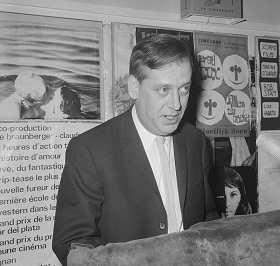
Jan Blokker (27 mei 1927 – 6 juli 2010)
In 1966
De Franse schrijver Louis-Ferdinand Céline (pseudoniem van Louis Ferdinand Destouches) werd geboren in Courbevoie op 27 mei 1894. Zie ook alle tags voor Louis-Ferdinand Céline op dit blog.
Uit: Journey to the End of the Night (Vertaald door Ralph Mannheim)
“Suddenly our street widened, like a crevasse opening out into a bright clearing. Up ahead of us we saw a great pool of sea-green light, wedged between hordes of monstrous buildings. And in the middle of the clearing stood a rather countrified-looking house, surrounded by woebegone lawns.
I asked several people in the crowd what this edifice was, but most of them pretended not to hear me. They couldn’t spare the time. But one young fellow right next to me was kind enough to tell me it was City Hall, adding that it was an ancient monument dating back to colonial times, ever so historical… so they’d left it there… The fringes of this oasis formed a kind of park with benches, where you could sit comfortably enough and look at the building. When I got there, there was hardly anything else to see.
I waited more than an hour in the same place, and then toward noon, from the half-light, from the shuffling, discontinuous, dismal crowd, there erupted a sudden avalanche of absolutely and undeniably beautiful women.
What a discovery! What an America! What ecstasy! I thought of Lola… Her promises had not deceived me! It was true.
I had come to the heart of my pilgrimage. And if my appetite hadn’t kept calling itself to my attention, that would have struck me as one of those moments of supernatural aesthetic revelation. If I’d been a little more comfortable and confident, the incessant beauties I was discovering might have ravished me from my base human condition. In short, all I needed was a sandwich to make me believe in miracles. But how I needed that sandwich!
And yet, what supple grace! What incredible delicacy of form and feature! What inspired harmonies! What perilous nuances! Triumphant where the danger is greatest! Every conceivable promise of face and figure fulfilled! Those blondes! Those brunettes! Those Titian redheads! And more and more kept coming! Maybe, I thought, this is Greece starting all over again. Looks like I got here just in time.
What made those apparitions all the more divine in my eyes was that they seemed totally unaware of my existence as I sat on a bench close by, slap-happy, drooling with erotico-mystical admiration and quinine, but also, I have to admit, with hunger. If it were possible for a man to jump out of his skin, I’d have done it then, once and for all. There was nothing to hold me back.
Those unlikely midinettes could have wafted me away, sublimated me; a gesture, a word would have sufficed, and in that moment I’d have been transported, all of me, into the world of dreams. But I suppose they had other fish to fry.”
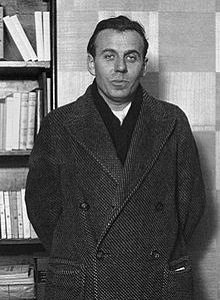
Louis-Ferdinand Céline (27 mei 1894 – 1 juli 1961)
De Belgische Franstalige schrijver Georges Eekhoud werd in Antwerpen geboren op 27 mei 1854. Zie ook alle tags voor Georges Eekhoud op dit blog.
Uit: Kees Doorik (Vertaald door August Peeters)
“Nelis Cramp was veel te slim, om niet te begrijpen, wat al voordeelen die openbare liefdadigheid opleveren kon, vooral voor een wroeter en een gierigaard als hij. Als ’t maar voor den scharbij was, deed hij voor niemand onder, en, zoo hij van den beginne af van dit middel geen gebruik gemaakt had om nog maar toe te potten, dan was het slechts, dat er hem nog een greintje eigenliefde overschoot.
Wat zouden de benijders en rondbrievers van Dinghelaar wel niet gezegd hebben, indien Nelis Cramp, de welgezette grondeigenaar van de Wit-Hoef, zijn toevlucht niet meer nam tot de eerlijke diensten van een struischen kerel der streek, om de zwakke armen van een stadskind uit te buiten. Wat een gebabbel! En wat zouden ze af te keuren vinden!
Nochtans, na al de leegloopers en stakkers van ’t omliggende in dienst gehad te hebben, – hij kon er geen enkelen houden, want ze lieten ’t allen bij hem staan, nog méer uitgehongerd dan ze binnen gekomen waren, tenminst als de pachter ze zelf nog niet doorzond, daar hij het karig loon en de harde korst brood nóg te veel betaald vond voor hun zwoegen – besloot hij, al moest zijn schrokkigheid hem het laatst aanzien in de streek kosten, zoo’n verstooteling van ’t ‘Gesticht’ in te nemen. De duivel hale hem, zoo hij ’t niet deed!
Niet alleen zou Nelis hem doen wroeten gelijk een volwassene, maar op den koop toe zou hij het kostgeld, dat die goede, liefdadige lieden uit de stad hem uitbetaalden, nog in den zak steken.
Kees zag dikwijls Cramp terug in den geest, gelijk hij was dien heuglijken dag, op zijn vijf en vijftigste jaar: aamborstig en ineengedrogen, met afgebrokkelde, zwarte tanden, galachtig, het vel zoo verfrommeld als een mispel; met leepoogen, een grijnzende lip, en een als weggedrukten platneus. Peper- en zoutachtige, pikkige haarklissen plakten op zijn slapen, en in de groote, behaarde ooren, die hem wijd van het hoofd stonden, droeg hij zilveren ringskens, als behoedmiddel voor ’t gezicht.
Hij onderbrak slechts zijn opwerpingen betreffende het smeeg uitzicht van den wees, om een trek te doen aan zijn korte, zabberig en doorgerookte steenen pijp – met een dekseltje van koperdraad, dat aan den steel bevestigd was -, of om groenige fluimen in ’t zandbakje te spuwen. Onder zijn borstelige, tot een helm samenlooepnde wenkbrauwen schenen zijn grijze oogen te slapen, onbetrouwbaar, gelijk de stilstaande moerassen in de griendlanden.
De bestuurder drong nog eens aan:
– Hij kan al lezen! Hij is zoo zacht als een lammeken en gehoorzaam gelijk ‘nen hond. Toe, wat geeft ge voor ‘
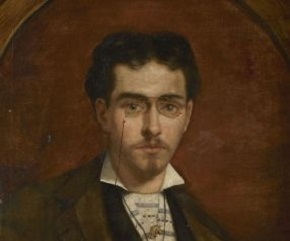
De Duits-Iraanse dichter en schrijver Said werd geboren op 27 mei 1947 in Teheran. Zie ook alle tags voor Said op dit blog.
Uit: Der lange Arm der Mullahs
„20. Juni 1981
Heute ist Said Sultanpur zusammen mit acht anderen hingerichtet worden. Er wurde bei seiner Hochzeit verhaftet und jetzt wegen Devisenschmuggels exekutiert.
Er war Dichter, Dramatiker, Schauspieler und Regisseur. Hier eine Geschichte von Said Sultanpur, der auch schon zu Zeiten des Schahs wiederholt im Gefängnis saß. Diese Geschichte erzählte er unmittelbar nach dem Sturz des Schahs bei einer Dichterlesung in Teheran: „1976 übersetzte ich ein Stück von Maxim Gorki, Die Parasi-ten, fand einen Intendanten, der bereit war, das Stück unter meiner Regie in seinem Theater aufzuführen, und fand auch die Schauspieler, die ich brauchte. Dann trug ich das Manuskript zur Zensurbehörde des SAVAK. Auf dem Manuskript standen vorschriftsmäßig der Name des Autors Maxim Gorki, mein Name als Übersetzer, der Name des Theaterintendanten und die Namen der Schauspieler. Ich bat also offiziell um die Genehmigung, das Stück auffüh-ren zu dürfen. Man nahm mir das Manuskript ab, schrieb meine Adresse auf und teilte mir mit, ich werde von der Be-hörde hören. Nach einigen Wochen erhielt ich einen Brief vom SAVAK, in dem man mich aufforderte, an einem bestimmten Tag vorstel-lig zu werden. Weiter unten stand deutlich und von Hand un-terstrichen: ,Der Autor des Stücks ist unbedingt mitzubringen.’ Der SAVAK wollte 1976 Maxim Gorki sehen.” Sultanpur hat all das mit- und überlebt. Dann wurde er vom Regime Chomeinis hingerichtet, während wir noch darüber witzelten, ob er in seiner Hoch-zeitsnacht nichts Besseres zu tun gehabt hätte, als Devisenschmuggel zu betreiben.
Herbst 1981
Puran wurde hingerichtet. Sie war eine schöne Frau, großgewachsen, charakterfest, intelligent und wortgewandt. Als sie hingerichtet wurde, war sie vielleicht 29 Jahre alt. Wir waren gute Freunde, hatten aber nie ein erotisches Verhältnis.“
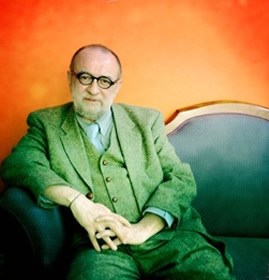
Said (Teheran, 27 mei 1947)
De Amerikaanse schrijver John Cheever werd geboren op 27 mei 1912 in Quincy, Massachusetts. Zie ook alle tags voor John Cheever op dit blog.
Uit: The Journals of John Cheever
“Prolly
want a crackeer.” Woke tired and took the 7:44. The river blanketed
with a mist. The voices overheard. “Well, then she boiled it and then
she broiled it.” He raised his face and drew over it a beatific look as
if he were tasting last night’s dinner again. “Well, we’ve got one of
those electric rotisseries.” “Oh, New York’s nothing like Chicago;
nothing like it.” On Twenty-third Street I read a sign: “DON’T LOSE YOURLOVED ONE BECAUSE OF UGLY FAT.” There was a window full of crucifixes
made out of plastic. The surface of the city is paradoxical. For a mind
cast in paradox it is reassuring to find this surface. Thinking again,
in the dentist’s chair, that I am like a prisoner who is trying to
escape from jail by the wrong route. For all one knows, that door may
stand open, although I continue to dig a tunnel with a teaspoon. Oh, I
think, if I could only taste a little success. But don’t I approach it
by deepening the pit in which I stand? Mary in the morning, asleep,
looking like the girl I fell in love with. Her round arms lie outside
the covers. Her brown hair is loose. The abiding quality of seriousness
and pureness.In the dark hour you cannot call on goods and chattels to
save you, or old ski trails or the paths to streams. You must find
something greater. And the mind in which the forces of contumely and
destruction seem greater than the forces of creativity. Creativity is
there, but it seems, in relation to the forces of destruction, like the
nipple on a balloon. So, made up of so much destruction and with such a
slender knowledge of love he appears poorly as a husband, son, and
lover—masked in a rag of a smile and a striped tie and a few faint
observations. Oh so deeply rooted in this mind are the needs and the
habits of prayer. Having triumphantly separated himself from the
foolishness of religion, he goes by the church—he hears the bells in the
morning—in the churlish and unhappy frame of mind of a man who has been
excommunicated. He feels the lash of expulsion. And oh this poor mind,
casting desperately around a room for some detail that will give it form
and meaning, seizes always on an ashtray heaped with butts or a crooked
stocking, a tear in the rug. And then he sees the sky! the poignant
blue, the line of darkness rising like a lid; the perfect clearness of
line and color that means that a northwest wind has scoured the overcast
and blown it out to sea. So his mind wanders between the ashtray and
the twilight while most of the known world lies somewhere in between. He
worries, he worries about his mustache, his old navy raincoat, his
weight, his hair, his teeth, the stiffness in his left knee, and if his
anxiety ever transcends this it is to worry about a nation of paltry
men, conceived in his image and likeness—or, if he is a world
federalist, to worry about a world. Why has the sweetness gone? It would
all come back with a new car or a bonus or a little of the recognition
that he deserves for his hard work.”
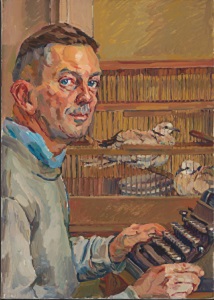
John Cheever (27 mei 1912 – 18 juni 1982)
Portret door Henry Koerner, 1964
De Amerikaanse schrijver John Barth werd geboren op 27 mei 1930 in Cambridge, Maryland. Zie ook alle tags voor John Barth op dit blog.
Uit:Where Three Roads Meet
“Not to mention what one learned from him in the classroom, as one’s junior instructor in Literature & Philosophy I & II, about Homer and Virgil (and Sappho and Petronius and Catullus), Plato and Aristotle (and the Gnostics and the Kabbalists), Dante and Chaucer and Boccaccio (and Scheherazade and Somadeva, Poggio and Aretino and Rabelais), and other classics on (and off) one’s freshman/sophomore syllabus, up to and including James Joyce’s Ulysses (and Finnegans Wake) …
“And trivia, class, as you may have heard, comes from Latin trivium: literally, a place where three roads intersect-as in Sophocles?-but by extension any public square where people swap idle gossip.” The Trivium was also (he went on) the medieval division of the seven liberal arts into Grammar, Logic, and Rhetoric-not to be confused with Cambridge University’s tripos, which was a different story altogether: “Okay?”
If you say so, Teach. And so indeed Al said, back then back there, in class and out-all which curricular and extracurricular input Will Chase eagerly “downloaded,” as one might put it three decades later, his own background having been a different story indeed from Alfred Baumann’s: Depression-era child of minimally schooled though by no means unintelligent small-town storekeepers in the state’s least affluent county; graduate of a wartime local public school system so strapped for funds and faculty that its eleventh grade was perforce one’s senior year, whence nearly none of the seventeen-year-old diplomates “went off” to college- especially if they’d been lucky enough to escape military service and thus unlucky enough to have no GI Bill to subsidize a higher education that, as a group, they weren’t competitive for admission to anyhow. A few of the girls managed nursing school, secretarial school, or the nearby teachers college; most became store clerks, telephone operators, beauticians, or/and young housewives and mothers. Most of the boys found jobs in local offices and retail stores or became tradesmen, farmers, or crab-and-oyster watermen like their dads before them. A few enlisted in the peacetime military.
And a handful shrug-shoulderedly took the application exam one spring afternoon for “senatorial” scholarships (whereof every Annapolis legislator was allotted a few to award and then to renew or redistribute annually) to various colleges and universities in the Old Line State. Having so done, the applicants proceeded to their summer employment fully expecting that at season’s end it would become their real employment: their life’s work.
Which, however, in Will Chase’s case and that of a few others in his (all-white) graduating class, it did not. Since junior high school-or “upper elementary,” as sixth and seventh grades were called in that abbreviated system-the lad had made an avid, if noisy, hobby of jazz percussion, and with comparably amateur-but-dedicated classmates on piano, trombone, and alto saxophone had formed a combo to play weekend dances at the local yacht and country club.”
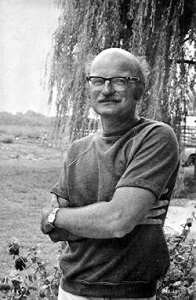
John Barth (Cambridge, 27 mei 1930)
De Tsjechisch-Israëlische dichter, schrijver, criticus en componist Max Brod werd geboren in Praag op 27 mei 1884. Zie ook alle tags voor Max Brod op dit blog.
Uit: Lord Byron kommt aus der Mode
„„AUGUSTA: Eine alberne Geschichte.
BYRON: Erzähle.
AUGUSTA: Sie ist ziemlich unanständig.
BYRON: Bitte.
AUGUSTA: Nein.
BYRON: Bitte.
AUGUSTA: Niemals. Ich sag’s nicht.
BYRON: Du mußt. AUGUSTA: Müssen?
BYRON: Mein altes Mittel. Aus Aberdeen.
AUGUSTA: Was denn?
BYRON: Weißt du’s nicht mehr? Ich drücke dir die Hand blau —
AUGUSTA (ist schon vorhin zurückgewichen): Das wirst du nicht.
BYRON: Wer hindert mich. (Verfolgt sie erst um den kleinen, dann um den großen Tisch herum) AUGUSTA: Weil du mich nicht fängst!
BYRON
(ereilt sie): Und doch! (Ihre Hand an sich reißend —plötzlich ernst) Es
ist meine Hand. Ich kann dir nichts tun. — Und Augen, Mund — alles wie
bei mir, als sähe ich hinab, zurück, ins Rätsel meiner Zeugung. (Er
streicht ihr über Haar und Wangen) Unseres gemeinsamen Vaters Kopf.
AUGUSTA (ihre Hand losmachend): Er war gewalttätig wie du.
BYRON (wieder heftiger): Jetzt erzähle deine Geschichte.
AUGUSTA: Ich will nicht.
BYRON: Du weißt: schon als Kind hat es mich verrückt gemacht, wenn du ein Geheimnis vor mir hattest. (Pause)“
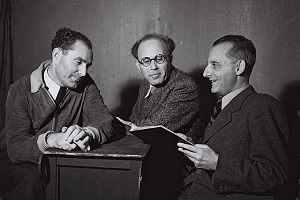
Max Brod (27 mei 1884 – 20 december 1968)
Hier echts met regisseurs van het Habimah theater in Tel Aviv
Zie voor nog meer schrijvers van de 27e mei ook mijn blog van 27 mei 2018 deel 2.

